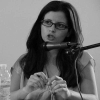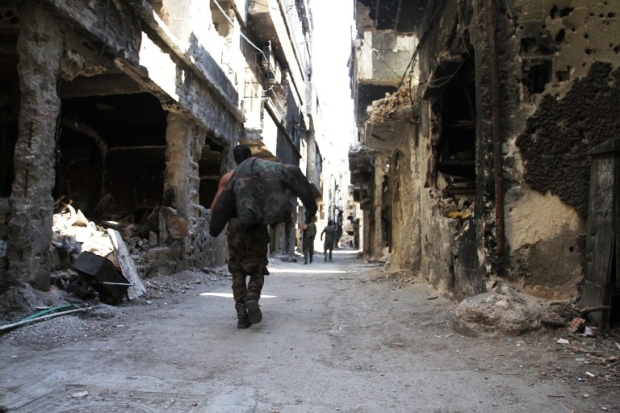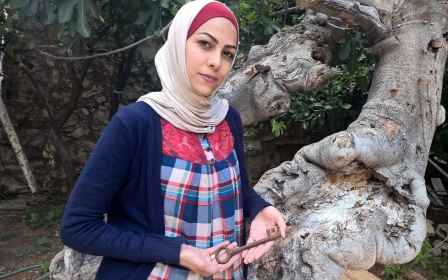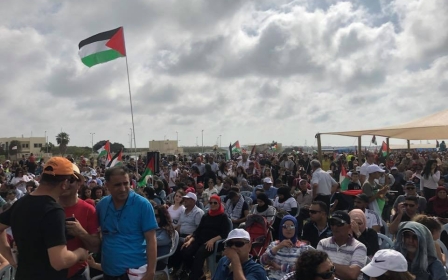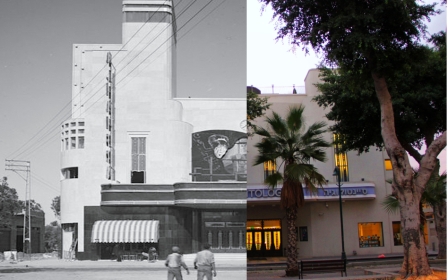Nakba as seen from Yarmouk: 'When we return to Palestine, we will take the camp with us'

As we commemorate 70 years of Nakba, Yarmouk camp, which used to house 350,000 residents - both Palestinian refugees and Syrians - has been levelled, with only a few thousand people estimated to remain inside.
Those who remain are rarely able to connect with the outside world, facing imminent dangers from the Syrian regime's bombing and starvation.
It is difficult to find words to explain what a camp can mean to its people. But as former Yarmouk residents mourn the death of their camp, watching from afar as their homes, memories and stories are razed, it is important to pay attention to these intricate layers of meaning.
Lives lived inside a camp
What a camp means to its sons and daughters may be difficult to comprehend, even for a Palestinian who has not lived in one. For many who live elsewhere, the camp is considered to be a simple "station" before returning home; this view tends to forget that whole lives were lived there, and many were born there.
Yarmouk, once home to the largest Palestinian refugee population, came under siege by Syrian President Bashar al-Assad's regime in 2012 under the pretext of fighting the Islamic State (IS). In 2015, the camp fell under the control of IS, and the regime’s siege continues to this date. Most residents were displaced to other parts of Syria, Lebanon or Europe.
Palestine was ever-present in the camp’s life and activities, the aspirations for liberation and return being passed through at least three generations
In Berlin, I met people fleeing from Yarmouk, arriving after a long journey via land and sea, having crossed borders on foot, faced death or escaped detention. To keep their faith in the right of return alive, I told them about Palestine - the real Palestine. One replied: "Palestine feels closer from Berlin than it felt from Yarmouk."
While the statement is unfortunate, it rings true. Palestinians from different parts of historic Palestine, along with refugees from camps or the diaspora, are only able to meet far away - too far from Palestine. As a Palestinian from Nazareth, I met friends from Gaza for the first time in Europe; I met refugees from Lebanon and Syria here as well.
I have experienced moments where I, a Palestinian with Israeli citizenship, would be with Palestinians from Gaza, the West Bank, Jerusalem, a refugee camp and someone born in exile. We would note that “all parts of the homeland are present”, as a reminder of our origins and affinity.
Palestinian-Syrian connection
Yarmouk camp, known as the "capital of the Palestinian diaspora", was not only the biggest Palestinian refugee camp, but also a centre of political and cultural activism. Many Palestinian political leaders arose in Yarmouk or were buried in the camp after being assassinated by Israel.
The camp itself sacrificed many of its people, who lived through the Palestinian struggle, while also establishing an active cultural life, including many cultural centres and libraries. Ala’ashiqeen, a popular Palestinian band, was formed in Yarmouk.
At the same time, Yarmouk, being home to Syrians too, created a unique connection between Palestinians and Syrians, explaining the early engagement of Yarmouk’s Palestinians in the Syrian revolution against Assad.
Palestinians' attachment to the camp is beyond emotional. It recognises attempts to kill the right of return. It is no secret that destroying camps serves a larger plan, which includes destroying people's attachment to their homeland and their striving to return to the homes from which they were forcibly displaced.
Not just a memory
One friend from Yarmouk recently told me: "We used to say that when we return to Palestine, we will take the camp with us." Another wrote: "Its narrow streets and neighbourhoods resembled the villages and cities of original Palestine. I was living on al-Quds street, I shopped at Lubya and Safad, I drank my coffee at al-Tira and visited my friends in Haifa.”
We hear similar stories from other camps. While the connection to Palestine is incredibly alive in these camps, the sense of being betrayed and left behind grows stronger. The genuine belief in a return home is overshadowed by the so-called "leadership" auctioning off that very right and dream.
While the Nakba carries with it the stories of millions of refugees, dispossession, loss and survival that must be shared and kept alive, this is not merely a memory, but an actuality unfolding before our eyes as we watch people dispossessed two and three times.
We must acknowledge that this horrifying suffering cannot and will not end unless the displaced are able to return to their homeland.
- Abir Kopty is a Palestinian writer and PhD student.
The views expressed in this article belong to the author and do not necessarily reflect the editorial policy of Middle East Eye.
Photo: Palestinians who fled the Yarmouk refugee camp sit on mattresses inside a school in the Syrian capital Damascus on 6 April 2015 (AFP)
New MEE newsletter: Jerusalem Dispatch
Sign up to get the latest insights and analysis on Israel-Palestine, alongside Turkey Unpacked and other MEE newsletters
Middle East Eye delivers independent and unrivalled coverage and analysis of the Middle East, North Africa and beyond. To learn more about republishing this content and the associated fees, please fill out this form. More about MEE can be found here.


